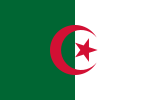| Part of a series on the |
| Culture of Algeria |
|---|
 |
| People |
| Mythology |
| Art |


Algerian wine is wine cultivated and bottled in Algeria. It has played an important role in the history of wine. Algeria's viticultural history dates back to its settlement by the Phoenicians and continued under the Roman empire. Prior to the Algerian War of Independence (1954–1962), Algeria was the largest wine exporter in the world, accounting for nearly two-thirds of the total international wine trade.[1]
Algeria has a long history of wine production dating back to the Roman era. During the late 19th century, Algeria's wine production peaked and it became the largest wine-producing country in the world, with an annual production of over 3 billion liters of wine. At the time, Algeria was a French colony and much of the wine produced in Algeria was exported to France to be used for blending with French wines.[2][3]
Most Algerian wine production takes place in the regions of Mascara, Mostaganem, and Tiaret, which are located in the northwest of the country. The most commonly grown grape varieties in Algeria include Carignan, Grenache, Cinsault, and Alicante Bouschet, which are used to produce both red and rosé wines.[4]
Algerian wines are known for their deep color, rich aroma, and full-bodied flavor. The climate and soil in Algeria are well-suited for grape cultivation, with warm, sunny summers and mild winters. In 2019, Algeria produced approximately 500,000 hectoliters of wine, making it one of the largest wine-producing countries in Africa. Most of this wine is exported to other countries, including France, Italy, and Spain, where it is used for blending and sold under other labels.[5]
With as much land under vineyards as the countries of Germany and South Africa, Algeria continues to maintain a wine industry with over 70 wineries in operation.
Despite the challenges facing the Algerian wine industry, there is a growing interest in producing higher quality wines and promoting Algerian wine as a unique and distinct product. Some producers are experimenting with new grape varieties and modern winemaking techniques, while others are focusing on marketing their wines to a domestic audience. As a result, there may be potential for growth and innovation in Algerian wine production in the future.[6]
- ^ Meloni, Giulia; Swinnen, Johan (2014). "The Rise and Fall of the World's Largest Wine Exporter—And Its Institutional Legacy". Journal of Wine Economics. 9 (1): 3–33. doi:10.1017/jwe.2014.3. hdl:10419/74974. ISSN 1931-4361. S2CID 232395699.
- ^ Finn, Katie (17 November 2020). "Vine Social: A Look Back at the Time When the World's Largest Producer of Wine Was … Algeria?". Coachella Valley Independent. Retrieved 25 February 2023.
- ^ Meloni, Giulia; Swinnen, Johan (2014). "The Rise and Fall of the World's Largest Wine Exporter—And Its Institutional Legacy". Journal of Wine Economics. 9 (1): 3–33. doi:10.1017/jwe.2014.3. hdl:10419/74974. ISSN 1931-4361. S2CID 232395699.
- ^ "Food and Agriculture Organization of the United Nations: "Algeria"". www.fao.org. Retrieved 25 February 2023.
- ^ "International Organisation of Vine and Wine (OIV) Statistical Report on World Vitiviniculture 2020". www.oiv.int. p. 32. Retrieved 25 February 2023.
- ^ Jancis Robinson, ed. (2006). "Algeria". Oxford Companion to Wine (Third ed.). Oxford: Oxford University Press. pp. 11–12. ISBN 0-19-860990-6.